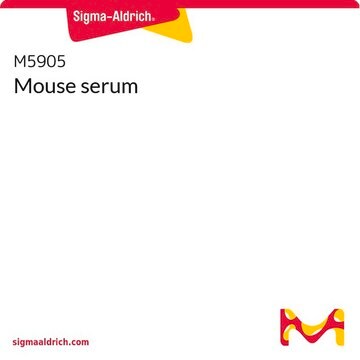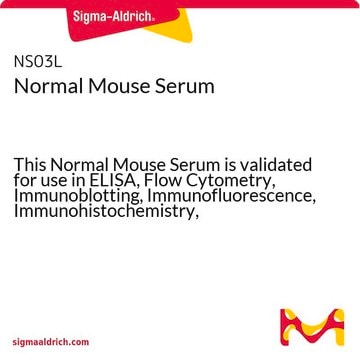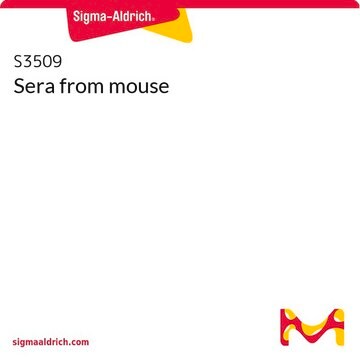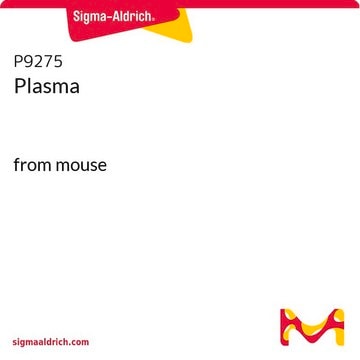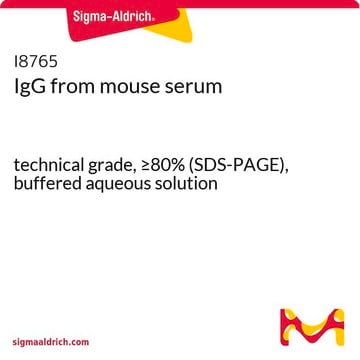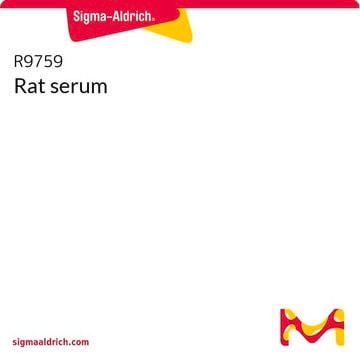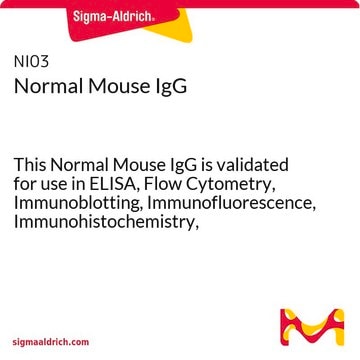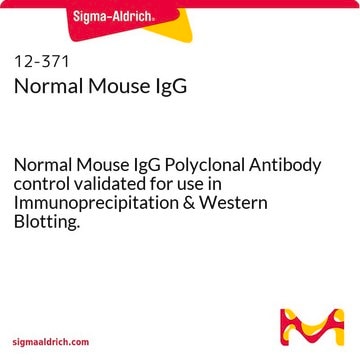S7273
Sera from mouse
frozen liquid (from clotted whole blood)
Sign Into View Organizational & Contract Pricing
All Photos(1)
About This Item
UNSPSC Code:
12352207
NACRES:
NA.71
Recommended Products
biological source
mouse
Quality Level
description
Contains no azides
sterility
sterile; aseptically filled
form
frozen liquid (from clotted whole blood)
origin
USA origin
shipped in
dry ice
storage temp.
−20°C
General description
Mouse serum is used in a variety of mouse cell culture systems to study viral infection, inhibition, and transduction processes.
Application
Sera from mouse has been used:
- as a source of inter-α-inhibitor (IαI) in protein modification to form the heavy chain (HC)-hyaluronan (HA) complex
- to culture primary mouse airway smooth muscle cells (MASM) and primary human airway smooth muscle cells (HASM)
- as analytical quality control (QC) sample for metabolomics analysis of treated mice serum
Suitability
Not tested for use in cell culture
Storage Class Code
10 - Combustible liquids
WGK
WGK 3
Flash Point(F)
Not applicable
Flash Point(C)
Not applicable
Personal Protective Equipment
dust mask type N95 (US), Eyeshields, Gloves
Certificates of Analysis (COA)
Search for Certificates of Analysis (COA) by entering the products Lot/Batch Number. Lot and Batch Numbers can be found on a product’s label following the words ‘Lot’ or ‘Batch’.
Already Own This Product?
Find documentation for the products that you have recently purchased in the Document Library.
Customers Also Viewed
Sven-Bastiaan Haange et al.
Metabolites, 12(7) (2022-07-28)
Bile acids are a key mediator of the molecular microbiome-host interaction, and various mass spectrometry-based assays have been developed in the recent decade to quantify a wide range of bile acids. We compare existing methodologies to harmonize them. Methodology for
Mark E Lauer et al.
The Journal of biological chemistry, 284(8), 5313-5323 (2008-12-17)
The covalent association of inter-alpha-inhibitor-derived heavy chains (HCs) with hyaluronan was first described in synovial fluid from arthritic patients and later described as a structural and functional component of hyaluronan "cable" structures produced by many different cells and stimuli. HC
Neutralizing antibodies against AAV serotypes 1, 2, 6, and 9 in sera of commonly used animal models.
Kleopatra Rapti et al.
Molecular therapy : the journal of the American Society of Gene Therapy, 20(1), 73-83 (2011-09-15)
Adeno-associated virus (AAV)-based vectors are promising gene delivery vehicles for human gene transfer. One significant obstacle to AAV-based gene therapy is the high prevalence of neutralizing antibodies in humans. Until now, it was thought that, except for nonhuman primates, pre-existing
Mark E Lauer et al.
The Journal of biological chemistry, 288(1), 205-214 (2012-11-21)
The covalent transfer of heavy chains (HCs) from inter-α-inhibitor (IαI) to hyaluronan (HA) via the protein product of tumor necrosis factor-stimulated gene-6 (TSG-6) forms the HC-HA complex, a pathological form of HA that promotes the adhesion of leukocytes to HA
Alexandra E Livanos et al.
Nature microbiology, 1(11), 16140-16140 (2016-10-27)
The early life microbiome plays important roles in host immunological and metabolic development. Because the incidence of type 1 diabetes (T1D) has been increasing substantially in recent decades, we hypothesized that early-life antibiotic use alters gut microbiota, which predisposes to
Our team of scientists has experience in all areas of research including Life Science, Material Science, Chemical Synthesis, Chromatography, Analytical and many others.
Contact Technical Service